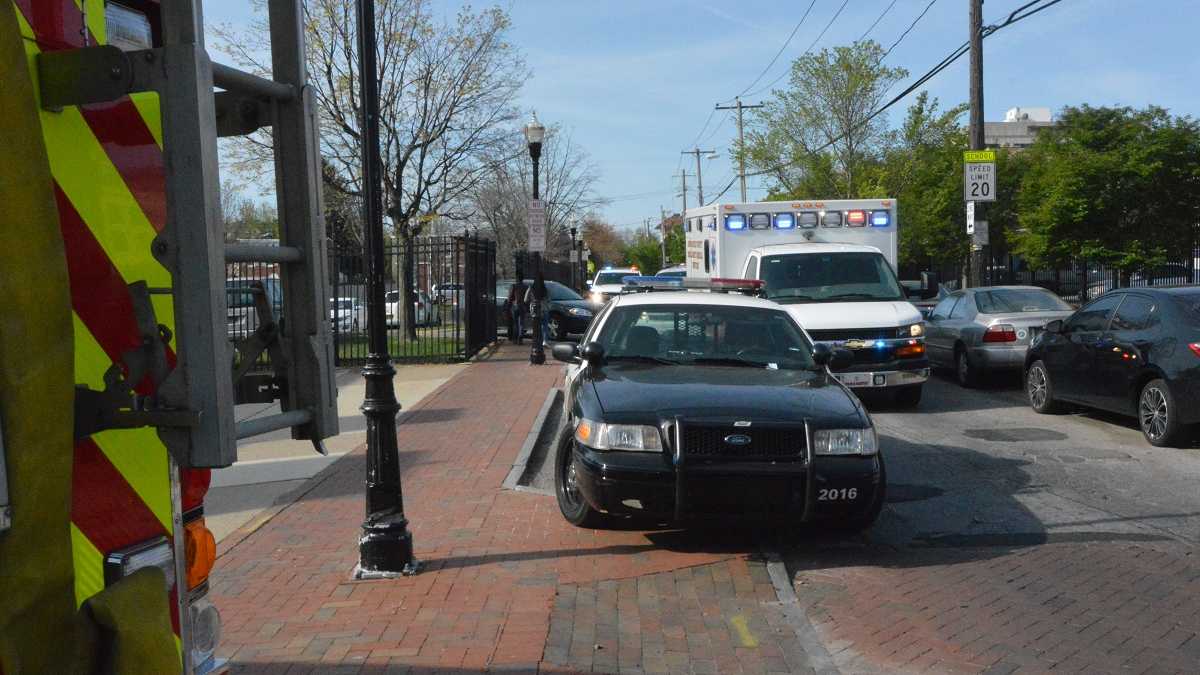Defense wraps up testimonies in Howard High death case

Police outside Howard High School in April 2016 after a student died following a fight. (File/WHYY)
A doctor said it’s impossible to predict if last year’s bathroom fight at Howard High School in Wilmington ultimately caused the death of student Amy Joyner Francis.
Defense witness Dr. Richard Ringel, a pediatric cardiologist at Johns Hopkins University Medical Center in Baltimore, was the last witness to testify on Monday during the fourth day of a trial for three 17-year-old girls charged with Amy’s death last year.
Two girls are charged with third-degree conspiracy, a misdemeanor, while a third girl is charged with criminally negligent homicide, a felony. Video shows the alleged attacker dragging Amy, 16, into a wheelchair accessible bathroom stall and beating her several times.
An autopsy showed Amy died of sudden cardiac arrest, due to a large Atrial Septal Defect and pulmonary hypertension, and brought on by the physical and emotional stress of the attack.
Deputy Chief Medical Examiner Dr. Adrienne Sekula-Perlman, who testified for the prosecution Tuesday, said that while the girl’s heart had been abnormal since birth, it wouldn’t have failed her if it weren’t for the attack. She had ruled the death a “homicide.”
Defense attorneys have argued the defendants do not have the maturity to understand the consequences of such a fight, and could not predict Amy’s death.
Dr. Ringel, who was questioned for more than an hour by attorneys on the case, said Amy likely had Eisenmenger’s syndrome, when a congenital heart defect causes pulmonary hypertension.
The cardiologist, who said he has not watched the video of the fight, said he cannot say if the attack caused Amy’s death, and that sudden deaths are unpredictable.
Ringel pointed out that a verbal altercation between the girls the previous day, which he presumes was “emotional,” did not cause cardiac arrest.
“We hear of high school or college athletes who die suddenly [on the field]…who played for months or years prior to that episode of sudden death…So what was different that day? We don’t know,” he said.
When asked if Amy could have lived longer if it weren’t for the attack, Ringel said, “I could not say…I can’t say if it would not have occurred another day from another kind of exercise or exertion.”
Doctors at Christiana Care did not discover Amy’s heart condition, according to medical records between 2004 and 2015. Ringel said because tests didn’t detect a heart murmur, it would have been difficult for doctors to diagnose something like Eisenmenger’s syndrome.
He said the combination of ASD and pulmonary hypertension is “very uncommon” for a teenager, and the development of Eisenmenger’s syndrome with ASD also is rare. Today, when ASD is identified it can be medically treated, Ringel said.
He also said ASD is not a heart defect associated with sudden collapse, and doctors do not stop patients from participating in physical activity.
Ringel said a child is “more likely to be struck by lightning,” than from cardiac arrest, and that there would be “no way to predict” death from the fight. The doctor also pointed to studies showing that the small amount of children who have died from Eisenmenger’s syndrome were resting at the time.
After witness testimonies wrapped up Monday, defense attorneys for the two girls charged with conspiracy also attempted to hold prosecutors responsible for Amy’s missing iPad that investigators could not find following the incident. They argued evidence on the device could have benefited their clients’ case.
However, Judge Robert Coonin sided with prosecutors that the State is not responsible for the iPad and that ample communication between Amy and the defendants via other devices has been presented in court. He also said there’s no evidence to suggest Amy even had the iPad in her possession around the time of the incident.
The non-jury trial began last Monday, with prosecutors arguing the three girls planned the alleged attack on Amy, who they say was caught off guard. Attorneys for the three girls began their defense Wednesday, trying to demonstrate the fight was not as brutal as prosecutors allege.
The trial is being held in Family Court, after Coonin ruled the girls should be tried as juveniles instead of adults. If she is found delinquent, the girl charged with criminally negligent homicide would likely face community monitoring until she turns 19. If convicted as an adult, she would face up to eight years in prison.
The three defendants chose not to testify. Closing arguments for the trial will be held Tuesday.
WHYY is your source for fact-based, in-depth journalism and information. As a nonprofit organization, we rely on financial support from readers like you. Please give today.





